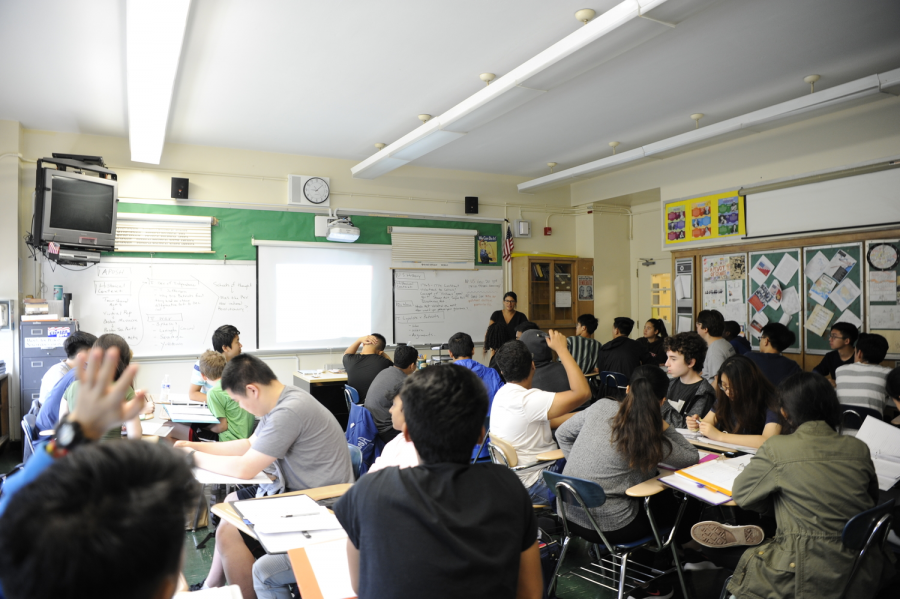The Impact of Kavanaugh
A Confirmation Hearing that Captivated the Nation
A Supreme Court discussion takes place in Ms. Kountourakis’ A.P. U.S. History class.
The search for Supreme Court Justice Anthony Kennedy’s replacement grew contentious as soon as it began. When Judge Brett Kavanaugh, a vocal conservative, was nominated to replace Kennedy, a moderate Republican swing vote, Democrats immediately protested. Thankfully, both Republicans and Democrats remained cognizant that regardless of who was confirmed, it was an undertaking of immense consequence. As Ms. Kountourakis, an A.P. U.S. History teacher at Bronx Science, put it, “It is a decision that will be felt for years to come.”
The nomination became even more controversial in the wake of a letter accusing Kavanaugh of sexual assault, written by Dr. Christine Blasey Ford, a professor at Palo Alto University and research psychologist at Stanford. Many attempted to discredit Dr. Ford’s account by questioning why she took so long to come forward, but her timing arguably makes her claims more believable. According to the Bureau of Justice Statistics’ most recent set of data, only 42% of violent sexual crimes are reported to the police. Since reporting rarely results in a conviction, many feel that accusations are not worth the emotional trauma. However, if your sexual assaulter were on the verge of receiving the power to make decisions that would affect the bodies of 125.9 million women, suddenly there would be a strong incentive to step forward.
“It is a decision that will be felt for years to come,” said Ms. Kountourakis, an A.P. U.S. History teacher.
During Kavanaugh’s second confirmation hearing, as Dr. Ford spoke, she was courteous and accommodating, apologizing for her lapses in memory and using neuroscience jargon to convey the scope of her trauma. Her earnestness and word choice painted a powerful picture of the alleged assault and her subsequent difficulties, leading even Fox News anchors to declare Dr. Ford a credible source.
Kavanaugh took a different approach. Instead of watching Ford’s testimony, he began his prepared opening statement with the claim that Dr. Ford’s accusation was part of a broad liberal conspiracy against Republicans orchestrated by the Clintons. He teared up while talking about working out with his high school friends and emphatically denied the alleged assault, his face bright red with fervor. When Senator Klobuchar asked Kavanaugh if he had ever blacked out due to drinking, he belligerently refused to answer and turned the question back onto her, even after she had just revealed her own father’s history with alcoholism. Kavanaugh apologized shortly after, but this moment was indicative of a prejudice against Democratic senators present across the hearing.
Kountourakis recalled a student opinion expressed during a current events discussion: “For any other position, the mere presence of these accusations would lead to doubts of competency and likely be grounds for dismissal.” Furthermore, regardless of the validity of Dr. Ford’s accusations, Kavanaugh’s demonstrated partisanship at the hearing is enough for one to wonder whether he is fit to serve on the court. Ultimately, the purpose of the hearing is not to serve as a criminal trial; it is a job interview.
Despite Kavanaugh’s tears, one must remember that not becoming a Supreme Court Justice is not a life ruining event. If Kavanaugh had not been confirmed, he would have returned to his position as Judge of the United States Court of Appeals for the District of Columbia Circuit – an extremely important judicial position – and he would not have been tried for the alleged assault.
Neither party provided suitable evidence to dismiss the other’s claims, but many still feel the hearing had tangible benefits. “The one good thing that came from this hearing was the precedent set for other women on trial. Compared with Anita Hill’s hearing in 1991, this year’s hearing in the midst of the #MeToo movement was far more civil. None of the senators overtly downplayed the gravity of the behavior she described, and they even called in a special female prosecutor to make her feel more comfortable,” said Chloe Frajmund ’19.
Despite new beneficial precedents set by the hearing, Kavanaugh was still confirmed and he will now weigh in on monumental cases for decades to come. Hopefully, Dr. Ford’s courage will not be forgotten, but it is too soon to declare the historical weight of this accusation and whether the #MeToo movement will result in lasting social change.
Julia Catrambone is a Copy Chief for the ‘The Science Survey’ and a Staff Reporter for ‘The Observatory.’ As Copy Chief, she edits articles by...

